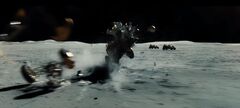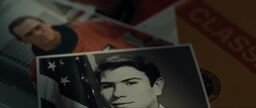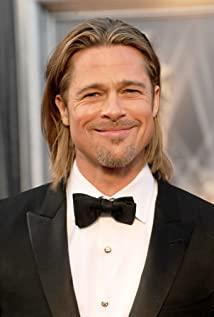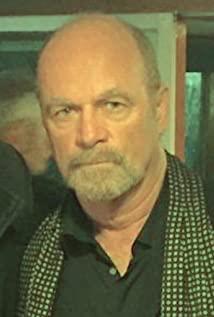Vonnegut wrote in "The Banshee of Titans", "The rewards given by the endless universe are only three: empty heroism, lack of humor, and meaningless death." This is in Split. The sentence that Nick wrote before the launch reveals a pessimistic view of human exploration. When the missionary astronaut is finally in the stars, he may be disappointed to find that nothing new is prepared for him in the universe. What he faced was still the self reflected on the helmet glass, with only the sound of his own heartbeat and breathing in his ears, enveloped by the magnificent sense of loneliness all over his body and the constant self-inquiry in his brain.
James Gray is definitely a believer in Vonnegut's cosmology. He is not interested in the wonders of the universe, nor does he intend to search for advanced beings like the creation gods, and even uses the failure of his father's mission in the film to directly deny the hypothesis that human beings are not alone in the universe. For him, the vast space is just a magnificent background board, or a mirror, reflecting the human struggles and pains that are not new.
Gray is very good at exploring the relationship between humans and space. He puts his protagonist into an unfamiliar scene, and uses changes in the environment and unexpected adventures to push them to understand and accept themselves. He put immigrant women into the United States of her dreams, and put the soldiers seeking fame into the dangerous South American jungle. This time, between the boundless darkness and the starlight, he put in the one that most resembled his own. man.
Roy, the protagonist of "Interstellar Exploration" is an excellent astronaut. Even if he accidentally fell to the cloud during the mission, his heartbeat never exceeded 80. The calmness that Roy is proud of, and his loyalty and passion for aerospace work, are inherited from his father, an aerospace hero who disappeared during a mission many years ago. However, he was quickly informed by the authorities that his father, who disappeared on the edge of Neptune, was not dead, and may be the culprit of the chaotic energy waves in the entire universe. Roy is asked to go to Mars and send a message to his father's spacecraft to get a specific location.
From the moon, to Mars, and then along the long space to reach Neptune's star ring, this journey is divided into several visual feasts, and each stop is full of detailed designs of the future world. Hoyte van Hoytema, who once shot "Interstellar" and "Dunkirk", covered the universe in his hands with stylized colors, bringing a calm and suffocating beauty.
This is an era in which space travel has long been popular. Commercial flights to the moon and shops on the moon base seem to pay tribute to "2001: A Space Odyssey". The stewardess smiled and informed that the blanket and pillow set cost $125, DHL and Subway's signatures. Close to the top of the crowd. And beyond the base covered by the funny commercial atmosphere, is a wilderness ruled by lunar pirates, covered with cold black and white. In such a white wasteland, a crazy max on the surface of the moon was staged. Chasing, gunfighting, and tense genre film elements did not fall, but they were almost silent because of the vacuum.
Mars is the farthest alien military base for mankind. The underground is shrouded in rust red, and a dog is hovering among the desolate white pillars. On the wall of the Comfort Room is a large illusion of gorgeous flowers and self-deceiving natural scenery, and outside the base, some are just pale yellow.
In addition to color, "Interstellar Exploration" also brings some space experiences from a subjective perspective. Flip and fall rapidly to the earth, breathing heavily and fighting with aliens in the cabin, crossing the blue asteroid belt, although not a novelty, it is also a manifestation of the immersive charm of space movies.
However, the exploration in the title of "Interstellar Exploration" is not an external journey through the interstellar. Roy, whose heartbeat is no more than 80, not only has no sense of danger, but his numbness and alienation have robbed him of the most basic perception of human emotions. He is an indifferent husband, bowing his head silently, waiting for the shadow of his wife next to his pillow to fade away; he is an out-of-group colleague, watching the other astronauts on the same ship having fun but he can’t blend in; and the deepest part of his heart, He is a son at a loss.
Roy, who was absent from his father's entire childhood, lost the anchor of his life in the process of growing up. He didn't know where he came from, let alone where he should go. No one has taught him how to live, and no one has taught him how to love, so he can only stick to the knowledge and guidelines taught by his father day after day, push away all those who express kindness around him, and he is empty and lonely. , In line with father's heroic posture on the photo wall.
This explains why all the conflicts and dangers in the first half of the film seem to lack tension, like deliberately keeping a cold distance from the audience. There is a barrier between us and Roy. The audience can't feel Roy's fear in the fall, can't feel his empathy for colleagues, can't feel his will to survive in the face of life-threatening danger, even if The close-up hits the furrows and eyelashes on Pitt's face, as if observing the character through a layer of frosted glass.
But as he got closer and closer to the end of the journey, with the updated psychological tests and Pitt's calm narration, the frosted glass was slowly broken open, and Roy became more and more like a normal human. His heartbeat began to accelerate, and the fragments of his memories kept flashing back. He began to miss his wife, remembered her tearful "I also have my own life", and began to think of the yellow jacket in childhood, and began to cry, dizzy, reflect and regret.
Brad Pitt dedicated one of the best performances of his career in this film. In the small recording studio, Roy gave up reading manuscripts and talked about the past with his father, the black and white movies he watched with him, and the math problems his father taught. In the life of an emotionally alienated man's self-dissection, one of Pitt's eyebrows trembled slightly, restraint and turbulence appeared on his face at the same time, and finally couldn't help but burst into tears.
In the process, his father was no longer just an empty hero label for Roy. He gradually learned his father's multiple identities from others. He was a criminal, a lunatic, and a loyal idealist. Standing in front of his father across the stars, Roy finally let go of his father's harm to himself and his mother for the first time, and for the first time truly understood him as a person, not as a father, husband, or a national hero. After thirty years, Roy finally completed the belated spiritual father-killing. From then on, he was an individual separated from his parents and received his second new life.
Some netizens joked that if you don't hate your father, you don't understand "Interstellar Exploration". But to understand Roy does not need to have such a strong emotion of hatred, because each of us more or less uses the affirmation of our parents to mark our own value, learn how to get along with them and blind date while hurting each other, and on the way to escape destiny, become The same person as the father or mother.
"Interstellar Exploration" is not a work without regrets. Its shortcomings are very prominent, slow pace, small format, dull and boring. As a science fiction film, there are also some omissions in the setting, which are destined to cause polarization of its reputation. From my personal point of view, compared to the director’s previous work, "Lost Z City," the two biggest shortcomings of "Interstellar Exploration" are the lack of unity between the clips and the almost abandoning of the creation of female characters.
"Lost City of Z" travels organically between the jungle and the real world, until the two worlds merge seamlessly, and the outer walls of the house at home grow dense leaves. But "Interstellar Exploration", although every scene is interesting enough, it still lacks a soft harmony in the overall sense. "Lost Z City" dedicated a rare image of a wife, independent, generous, gentle and capable, but the two female characters in "Interstellar Exploration", the wife played by Liv Tyler, spends no more than 3 minutes on the screen, played by Ruth Negga Although there was an impressive gaze after being refused to participate in the mission, this character still hardly made much effort in shaping.
But putting aside these shortcomings, "Interstellar Exploration" is a very special space movie. After Armstrong successfully landed on the moon, he almost thanked the staff during interviews, or spoke about his findings in scientific terms. As a person who left footprints on the surface of the moon, he said nothing about his feelings there, his emotions, whether he would be lonely when looking back at the earth in space, or whether the infinite universe reminded him of family. "The First Man on the Moon" fills in this missing dialogue to a certain extent, but "Interstellar Exploration" goes a step further and uses an entire universe as a background to explore personal emotional and psychological problems. This kind of special deserves any kind of praise.
When Roy returned to the earth and finally became a complete person, he said in the last psychological test: "I still don't know anything about the future, but I am no longer afraid. I have a connection with others around me, and I share with them. Bear the burden of life."
"I will live and then love."
View more about Ad Astra reviews











